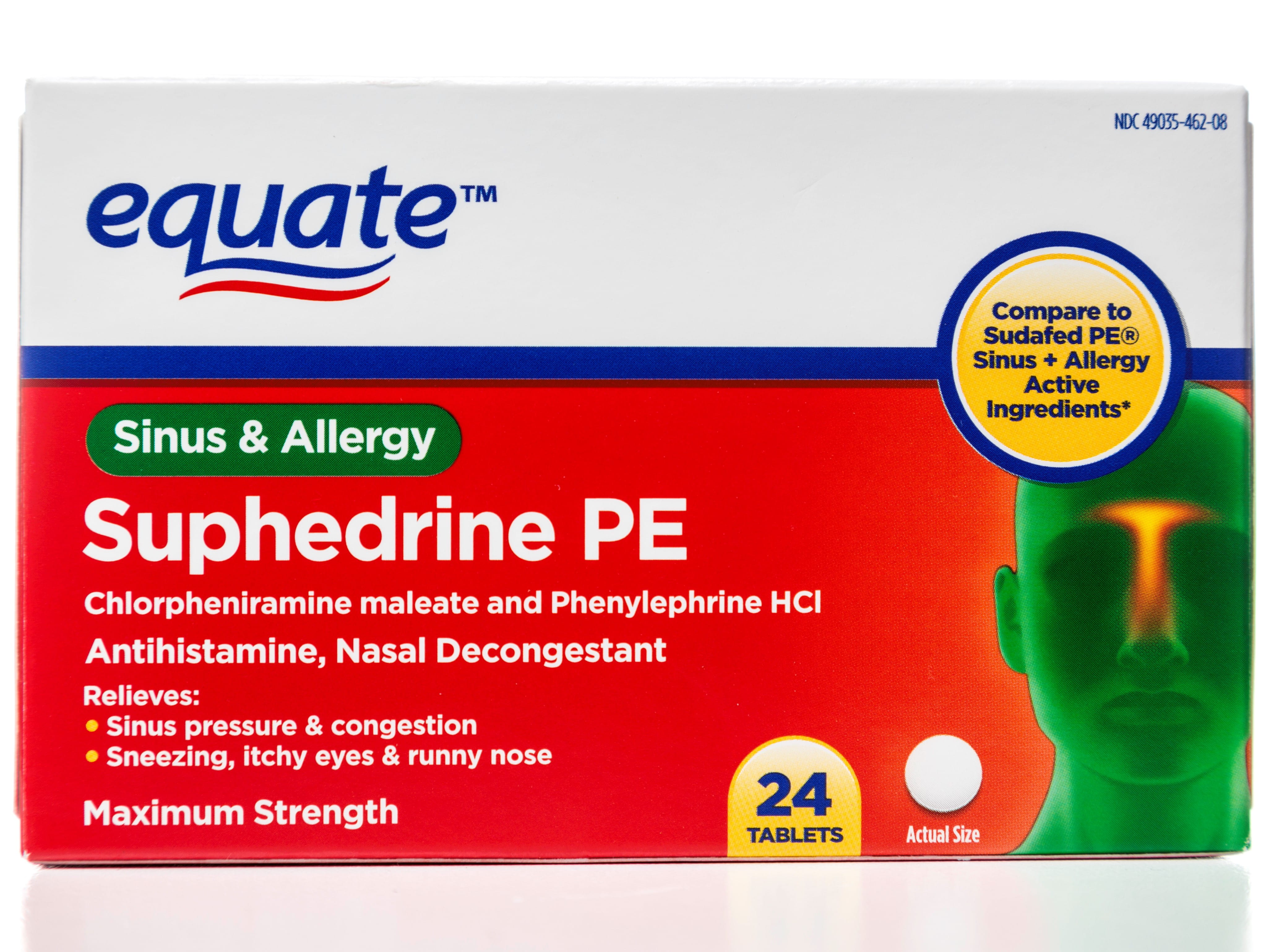Are Over-the-Counter Phenylephrine Products Safe and Effective?

The Bottom Line
Phenylephrine is a decongestant available in many over-the-counter cold products. A US Food and Drug (FDA) Advisory Panel reviewed recent studies and found that oral phenylephrine is no more effective than placebo for the treatment of nasal congestion. Based on these findings and additional review, the FDA has proposed that products containing oral phenylephrine be removed from the market.

What is phenylephrine?
Phenylephrine is an over-the-counter decongestant that has been on the market for decades. Like other decongestants, it is thought to work by causing constriction of blood vessels in the nose to allow clogged nasal passages to drain. It is one of the most common ingredients in over-the-counter cold products, such as Sudafed PE. It is available alone and in many combination products, and in oral and nasal formulations. The FDA has traditionally categorized phenylephrine as Generally Recognized as Safe and Effective (GRASE).
Why did the FDA propose a ban on phenylephrine?
On Nov. 7, 2024, the FDA proposed ending use of oral phenylephrine products due to a lack of efficacy. It is important to know that there were no concerns raised regarding the safety of oral phenylephrine. It is the duty of the FDA to ensure that approved products are both safe and effective. Americans spent an estimated $1.8 billion on phenylephrine products last year. Buying these products may be an unnecessary expense if phenylephrine does not work. Just as bad, all medicines have risks, and if they don’t also have benefits, we should not take them. Because phenylephrine was approved many years ago, the studies used to determine whether it was safe and effective were not conducted as well as clinical studies are conducted today. More recent information suggested that oral phenylephrine was no more effective than placebo for the treatment of nasal congestion. This decision followed the advisory panel that reexamined information regarding the efficacy of oral phenylephrine as well as additional FDA review.
What did the FDA phenylephrine panel find?
After reviewing the initial approval studies and more current information, the panel unanimously voted that oral phenylephrine was no more effective than placebo in treating nasal congestion, even at higher doses than what is available over-the-counter now. It is important to note that the review of the studies discovered no safety concerns. Additionally, nasal phenylephrine products were not reviewed.
What is the status of phenylephrine today?
The current status is that FDA is proposing to remove oral phenylephrine products from the market. The proposed rule is not final at this time. Public comments are accepted until May 7, 2025. Once the comment period is closed, the FDA will review the comments and a final decision will be made. If the rule is made final, oral phenylephrine products will be removed from the market. With that said, the removal may not be effective immediately to allow time for manufacturers and consumers to plan accordingly. Public comments can be submitted here.
What do I do if I have a phenylephrine product at home?
There are currently no safety concerns about oral phenylephrine. Patients can continue to take the product if needed for nasal decongestion if it works for them. Do not take more of the product than recommended if it is not working. High doses of phenylephrine are associated with increased blood pressure. Phenylephrine is also available in combination with other over-the-counter medications, such as acetaminophen, dextromethorphan, and antihistamines, which can be toxic if taken in large doses.
What can I take for nasal congestion if phenylephrine does not work or is no longer available?
There are several alternative medications available over-the-counter to treat nasal congestion. Oral pseudoephedrine is available behind the pharmacy counter but without a prescription. There are also decongestant nasal sprays containing phenylephrine or other ingredients such as oxymetazoline (Afrin) for short term relief of nasal congestion due to colds. In cases of congestion due to allergic rhinitis, there are antihistamines and nasal steroids in addition to oral and nasal decongestants. Non-medicated nasal saline sprays can also help.
Does phenylephrine nasal spray work?
The FDA panel did not evaluate the phenylephrine nasal spray-only oral products. The nasal spray will remain available for the foreseeable future.
What should I do if I took too much phenylephrine?
If you or someone else takes too much phenylephrine, takes it by mistake, or you have questions, help from experts is available through the webPOISONCONTROL online tool and by phone at 1-800-222-1222. Poison Control guidance is always free, confidential, and available 24 hours a day online or by phone.
Maryann Amirshahi, PharmD, MD, MPH, PhD
Medical Toxicologist
Poisoned?
Call 1-800-222-1222 or
Prevention Tips
- Do not take more of a cold product than recommended, even if it is not working.
- Read cough and cold product labeling carefully to avoid doubling up on ingredients.
- Most cough and cold products are not labeled for children under 6 years of age.
- Store all medications up and away, out of the reach of children.
This Really Happened
A 42-year-old man took 6 tablets of 10 mg phenylephrine over 2 hours to treat bad allergy symptoms. His wife was worried about him, so she called Poison Control, which asked if he was having any symptoms. The wife reported that he felt a little drowsy and wanted to lie down. Poison Control suggested that it was okay for him to lie down. Drowsiness was not an expected adverse effect, but it would be best not to drive or operate machinery for 6 hours. The couple was advised to call back with any changes or concerns. The following day, the poison specialist checked in on the patient. The wife advised that he was irritable, but otherwise fine. (from Haugh & Watson, 2018)For More Information
References
Poisoned?
Call 1-800-222-1222 or
Prevention Tips
- Do not take more of a cold product than recommended, even if it is not working.
- Read cough and cold product labeling carefully to avoid doubling up on ingredients.
- Most cough and cold products are not labeled for children under 6 years of age.
- Store all medications up and away, out of the reach of children.
